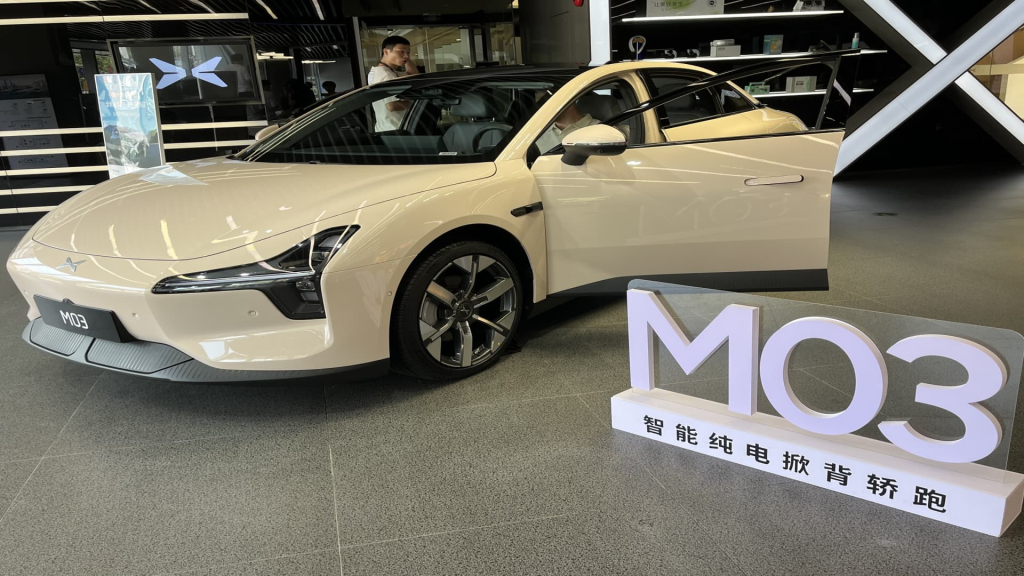BEIJING — Chinese electric vehicle startup Xpeng is maintaining strong sales performance amidst increasing competition, particularly as BYD solidifies its dominance in the market amid a challenging pricing environment in China.
On Tuesday, Xpeng announced it delivered 34,611 vehicles in June, marking the company’s eighth consecutive month of exceeding 30,000 deliveries.
The company’s shares jumped over 2% in New York trading. However, Xpeng did not clarify the breakdown of which deliveries comprised its advanced driver-assist vehicles compared to its more affordable Mona model.
The ongoing price war in China’s electric vehicle sector has intensified recently, leading to government criticisms of “involution,” where competition may not be beneficial. On Tuesday, President Xi Jinping presided over a significant financial and economic commission meeting that emphasized the necessity for greater governance over “low price, disorderly competition,” as reported by Chinese state media, according to Finance Newso.
Mixed results for competitors
In contrast, Xpeng’s competitors listed in the U.S. and focused on the more premium vehicle segment experienced less robust sales growth.
Diminished sales trends were seen by Geely-backed Zeekr, which reported 16,702 deliveries in June, reflecting an 11.7% decline from the previous month and a 16.9% drop year-over-year.
Nio reported a total of 24,925 deliveries in June, representing a slight increase from May due in part to growth in its premium “Nio” line and its more economical Onvo and Firefly offerings.
Li Auto disclosed 36,279 vehicle deliveries for June, an 11.2% decline compared to May. However, the automaker achieved total deliveries of 111,074 vehicles in Q2, surpassing its revised forecast of 108,000 cars. Following a system upgrade, the company had recently revised its Q2 delivery guidance downwards by over 15,000 vehicles.
Nomura analysts noted in a report that Li Auto has implemented a ban on incentivizing salespeople to share their commissions with customers, beginning in early June 2025. They believe this move is intended to reduce competition among sales staff while enhancing service quality and brand significance.
Li Auto predominantly features SUVs equipped with a fuel tank, which alleviates one of the primary consumer concerns for electric vehicles—driving range. The company saw its monthly deliveries exceed 50,000 late last year.
Tesla under pressure
Xiaomi, which is listed in Hong Kong, reported deliveries exceeding 25,000 electric vehicles in June, marking a slight decrease from the previous month.
In a competitive move, Xiaomi announced that its upcoming YU7 SUV would be priced 10,000 yuan ($1,400) lower than Tesla‘s Model Y. Xiaomi reported over 240,000 pre-orders for the YU7, claiming it offers a longer driving range than the Model Y while admitting that Tesla’s driver-assistance technology remains more sophisticated.
According to Xiaomi’s online portal, deliveries for the YU7 are now anticipated to take over six months, significantly longer than the initial delivery window of one to five weeks.
Industry analyst Junheng Li, CEO and head of research at JL Warren Capital, speculated that a considerable portion of new orders may originate from scalpers due to high anticipated demand for the new model.
Li also projected that Tesla’s Q2 sales in China would reach approximately 128,000 units, a 12% decrease year-over-year, influenced by escalating competition from new model launches by Chinese manufacturers.
In response to market conditions, Tesla raised the price of the Model 3 long-range all-wheel drive by 10,000 yuan, as per its website update on Tuesday.
As of May, Tesla ranked as the fifth-largest automaker by market share within China’s new energy vehicle sector, which encompasses both fully electric and hybrid vehicles. Data from the China Passenger Car Association indicated that Tesla’s retail sales during the first five months of the year totaled slightly over 200,000 vehicles, with June figures yet to be released.
Leapmotor, in collaboration with Stellantis, reported steady growth with record deliveries of 48,006 cars last month. Aito, which incorporates Huawei technology for its entertainment and driver-assist systems, registered 44,685 car deliveries for the same period.
Competing against a giant
BYD continues to dominate the market, with a reported rise in passenger car sales to 377,628 units in June, over half of which were entirely electric vehicles. The company’s sales for the first half of the year totaled 2.1 million vehicles.
Comparatively, Leapmotor and Li Auto each exceeded 200,000 deliveries in the first half of 2025, while Xpeng approached that threshold with 197,189 vehicle deliveries.
Xiaomi’s cumulative deliveries for the year thus far have surpassed 150,000 vehicles, based on Finance Newso’s calculations from available data.
According to Michael Dunne, head of advisory at Dunne Insights, BYD, Xiaomi, and Geely are likely to endure through any tumultuous industry consolidation. He expressed concerns for Nio, despite its strong product lineup and operational efficiency, pointing out potential financial vulnerabilities.


























